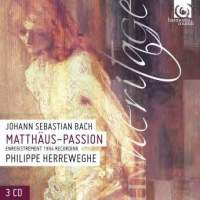Texte paru dans: / Appeared in: |
|
|
Outil de traduction ( |
|
|
|
|
|
Reviewer: Edward
Strickland
N.B. This
review was written in 1985 I'm a chronic complainer about the English translations of Picander's text, particularly their rhetorical and rhymae causa distortion of the earthy/convoluted German Baroque sensibility, which is usually Anglicized into saccharine piousness. Though HM's translators are listed collectively, no one in particular is credited in this instance. Thanks anyway. The accompanying notes consist of a far too sketchy piece on the reconciliation of Orthodoxy and Pietism in Bach's settings of the Passion, a fascinating—alternately illuminating and perhaps extravagant—essay on Bach's numerology, and very enlightening notes by the conductor on the rhetorical tradition of Bach, written in the vein of Schweitzer and Pirro. Even more interesting is Herreweghe's translation of his rhetorical arguments into music. For this and his sense of pace his reading of the Passion is indispensable even to those who revere Richter or Klemperer for their monumentality. There is not, of course, the same sense of massiveness here, but what is lost in sheer might is made up in a very cogent sense of proportion. To traditionalists Herreweghe may seem overly fleet initially, but I find his tempos extremely satisfying in context. The choral work is thoroughly proficient if not, as mentioned, quite as overpowering as elsewhere. (I'd certainly like a bit more ferocity in the turba sections.) As for the soloists, René Jacobs is the standout. He is for my taste the most purely musical countertenor performing today, and his “Erbarme dich“ is every bit as moving as the masterly rendering of Dame Janet Baker with Richter. Evangelist Howard Crook is more impressive for his transparency than his fervor; while Ulrik Cold as Jesus lacks Fischer-Dieskau's elegant nobility, he is a model of stability and strength. White-voiced soprano Barbara Schlick is not always entirely secure in the lower register but blends superbly with the period instruments (in general less colorful than Harnoncourt's) and with Jacobs in “So ist mein Jesus nun gefangen,“ a highlight of the set despite the less than electrifyingly partisan chorus. On the whole, this performance ranks with the handful of first-rate accounts of the Saint Matthew Passion no Bach lover will miss experiencing. | |
|
|
|
|
|
|
|
Cliquez l'un ou l'autre
bouton pour découvrir bien d'autres critiques de CD |
|




